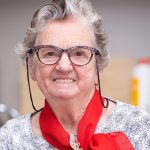“Social interaction is probably close to the best medication you can take.”
For Jan, who for over two decades has been living with bronchiectasis, being an integral part of a support group facilitated by Lung Foundation Australia has been a rewarding experience.
She has seen first-hand the benefits for mental health, understanding and self-management.
“Being with others who understand and connecting is so important,” Jan says.
“We are so blessed to live in this age where there are so many ways to connect, whether it be by phone or online. Even in isolation (with COVID-19 restrictions), we were not isolated.”
Now 83, Jan was diagnosed with bronchiectasis and NTM (Nontuberculous Mycobacterial Lung Disease) in 2001. She felt “relief” to have a diagnosis, as it had taken a number of CT scans and other medical procedures to finally get to that stage.
“Most find the unknown is the hardest thing,” she says.
“Once you know, you can research and importantly, you find out that others have the same condition. You find support … that you are not alone.”
Jan says once she was able to explain her lung condition to friends, it also became “a lot easier for them; they realised it was not going to take my life immediately”.
“Speak to your doctor about your diagnosis. Learn all you can, so that you can understand your condition and accept it. Once you learn to manage it, your whole persona changes.
“Listen to and accept what your body is telling you … if you are feeling short of breath, don’t try to push yourself. Slow down.”
Jan has been running a support group since 2012, having originally been driven by a simple motivation: “if you need it, somebody else will need it”.
“Some people come along at first knowing nothing about their condition. It’s great to see them blossom as you explain things to them.”
Throughout Australia, support groups facilitated by Lung Foundation Australia provide a safe space for people to feel heard and understood. Having personally experienced the benefits of being in a supportive peer network, Jan urges the wider community people to donate “so that others can have a better standard of life”.
No one should ever feel alone. Your donation helps us to fund support services that help people negotiate the challenges of living with a lung disease. Support us to support our community.


